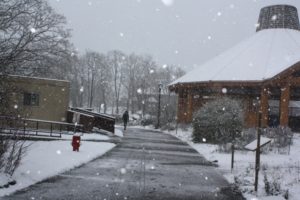The Victoria Foundation has granted $40,000 in funding to support Indigenous students in Camosun College’s interdisciplinary Aboriginal Culinary Arts, Tourism and Hospitality program. The funding will be dispersed to students in order to provide financial support for costs associated with housing and food.
Developed in partnership with the Songhees Nation, Camosun’s Aboriginal Culinary Arts, Tourism and Hospitality program is a 12-month entry-level program that includes a two-month work placement and is specifically designed for Indigenous students preparing for a career in Aboriginal tourism. Students gain work experience and learn skills from a variety of applied tourism, culinary arts, and hospitality courses; upon graduation, they earn a Professional Cook 1 certification.
One aspect of the program that was very important to the Victoria Foundation was that it was specifically designed to provide Indigenous students with a direct, practical road to employment that’s firmly rooted in Aboriginal culture.
“It aligns really well with our strategic priorities, because our two main focuses are housing and food security,” says Victoria Foundation communications specialist Kyle Wells. “So, in this case, the bursaries will be providing financial support for housing and food costs to these students, who are also taking a course that is related to food security, and this is [meant to help] people prepare for a career in Aboriginal tourism. It fits in perfectly with all our strategic priorities.”
A strong focus of the college’s program is on culinary arts, which are directly linked to the burgeoning industry of Aboriginal tourism. This focus serves to ground the program firmly in Indigenous culture.
“A lot of events include food, and that’s a big part of our tradition, our culture,” says Camosun Indigenous recruiter and on-campus support Lana Pagaduan. “Whenever there’s a gathering, there’s food along with that.”

The Camosun College Student Society (CCSS) is very supportive of the program and the $40,000 from the Victoria Foundation.
“We think it’s great,” says CCSS external executive Fillette Umulisa. “There’s a lot of barriers that students face, and this type of funding by community donations definitely allows students to concentrate more on their studies. We think it’s a very great initiative, especially [with the support] from the Victoria Foundation, and we’d love to see more of this come around.”
Wells is enthusiastic about the practical applications of a program that is specifically tailored to help Aboriginal students excel in a field closely linked to their historical culture.
“It seems like a great opportunity, because you’re getting all these different certifications all at once, and you’re working in an industry that is growing, and it’s culturally relevant and creating opportunities,” he says.
Pagaduan, who has been directly involved in the program, says it’s just concluding a two-year pilot project, and she has seen positive impacts on the students involved.
“This program has helped students turn their life around,” she says. “In their journey to better their health and way of living, this program helped, as it included their passion of cooking.”
Pagaduan says that the program has provided a strong positive drive to help young Indigenous people move their lives forward and overcome personal roadblocks.
“There are a lot of social issues, challenges, and barriers for our people on the reserves. One of the biggest struggles for an Indigenous student is living support, as they have no income, and no means of paying rent or providing for their family,” she says. “This was an awesome opportunity for those who entered and completed the program.”
Wells agrees that the program could have really strong positive reverberations through the community.
“It seems like a really good opportunity to help young Aboriginal people—who have a harder time getting started in our economy and our education system—to find a way to prepare themselves for the working world and to do so in a way that is culturally relevant to them,” he says.
